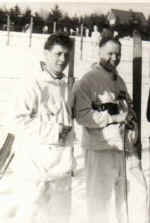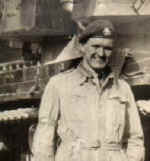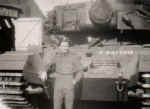StablesHistory.co.uk
The Definitive History of the Surname
STABLES in Yorkshire
| ||||||
The Autobiography of Brian Stables (Part 7) |
|
Introduction |
Twenties |
| This is the seventh part of
Brian Stables's fascinating and very funny autobiography, which is
written in his own words.
Brian was born in Tickhill in 1929 and emigrated to Canada in 1976. He is currently serialising his life story for us. He has also provided a superb collection of photographs to accompany his story. Click the photo for a larger image.
|
The
first two or three years of my twenties was a time of missed
opportunities, not just missed, but unforgivably, avoided. I eventually
worked it out, (with the push of a couple of girlfriends, (I confess).
My whole perception of life had been changing from the day I had left home in 1947, and by the time I returned from Palestine I knew I would be unable to return to the normal routine of civilian life. This was reinforced for me when Dad took me for a drink to the Working Men’s Institute, the ‘stute’ as it was known. We were not allowed to wear civilian clothes in those days, so I stuck out like a sore thumb. One of dads cronies came over and said “Hello Bob, I hear tha’s bin o’er t’watter”, I don’t know how Bob would have felt about that, but I felt honoured, I acknowledged that I was just home from the Middle East. The man continued; “Owd Tom ower theer ‘e’s bin abroad, tha’ knaws, he were in T’Isle ‘o Wight”, The moment Dad failed to correct the fellows mistake over my name, nor did he point out that I had travelled somewhat further than the Isle of Wight was when I began to recognise that I did not ‘fit in’ anymore, and there was I, thinking I was the returning hero! I rejoined the Regiment in Catterick where we took up a role as a Royal Armoured Corps training regiment and re-equipped with Comet tanks. The closest town for the ‘bright lights’ was Richmond, with Darlington a more exotic attraction when one was in funds, so to speak. It was in Darlington that I met a young woman a couple of years older than I, but keen to make my acquaintance and this was reciprocated, she had her own apartment which made it easy for us to get together and life was fun for a while, she it was who pointed out that I could; “do better”. I owe her for that. After the passage of about a couple of years, we left Catterick for Chester, and then to Salisbury Plain, before transfer to Germany in 1951. We were equipped with the latest models of Centurion tanks and began practicing very hard at the new methods of N.B.C. and tank warfare. We moved into a barracks that had previously been occupied by a Panzer Regiment. In comparison to our primitive accommodation in England, we lived in the lap of luxury. Hot water on tap, central heating, comfortable living quarters, canteens and messes... The whole country was still devastated from the horrors of the war and there were many camps of ‘D.P.s’ or displaced persons. Coincidentally, many years later, about 1979, whilst now living in Canada, we moved next door to a lady of Russian extraction who had been in one of these camps as a child, indeed from her description it could have been one close to a training area of ours, needless to say she was not very keen to talk about it too much. We moved into a barracks that had previously been occupied by a Panzer Regiment. In comparison to our primitive accommodation in England, we lived in the lap of luxury. Hot water on tap, central heating, comfortable living quarters, canteens and messes, plus all the facilities needed to enable us to maintain and operate our tanks in good order. Leisure time was a little restricted but this was not too onerous, we had to ‘book’ out of barracks and ‘book’ back in again upon our return, the deadline was midnight so it did interfere a little with ones love life, but that’s the way it is sometimes. I found it interesting that the adjacent City of Munster, like many European cities at that time, was totally flattened; just heaps of rubble with roads bulldozed through, but the Barracks, situated just outside the city, (or what was left of it) at a village named Gremmendorf, was in good shape. Another oddity was that England was still heavily rationed for foodstuffs whilst many food items were readily available in the local German stores; I remember going home on leave and being issued a ration book, but also taking butter and sugar along with me. The largest unfilled need of the German civilian population seemed to be cigarettes and coffee and there was a brisk ‘black market’ trade in these commodities. Our cap motto, (badge) of skull and crossbones created no small interest with the civilian population, the first reaction was one of wariness, and they must have thought they were in for a repeat of the bad old days of the SS again. We soon settled in however and became accepted for what we were, just another Regiment, albeit an elite one. We were kept on our toes with regular ‘Bug outs’ at odd times during the day or night, when the alarm was sounded we rushed around hoping it was not really the expected Soviet invasion. There was a rendezvous at a predetermined location where we formed up with the tanks ready for action, and prepared to fend off the bad guys. Just long enough for the politicians to reach safety was our common, irreverent, understanding at the time! There was frequent leave to England. We travelled in style via troop train and ship, the latter ferrying between the Hook of Holland and Harwich, then train again to Liverpool street station in London, from where we were free to go home. The German trains were extremely well organised and had different colour codes indicating the destination. They comprised of former long distance luxury railcars and the food, cooked en route in the catering cars, was amazingly good, the troopships were cramped and miserable, Harwich, as most sea ports do, always felt dull and miserable. ...we were encouraged to participate in such sports as could prove useful in the event of emergency... I chose downhill skiing, simply because that was where the girls were to be found! As I mentioned earlier I began to understand the need of an education, I took the Army education examinations up to ACE first class, this led to promotion and made life easier, instead of getting confined to barracks as punishment I was now able to merely lose rank. The army was also changing direction and instead of ignoring the off duty activities of its soldiers, we were encouraged to participate in such sports as could prove useful in the event of emergency; such as skiing, sailing and parachuting etc., drinking was acceptable but drunkenness was discouraged. I chose downhill skiing, simply because that was where the girls were to be found! One memory of things getting out of hand came about when the Regiment entrained for a journey to the Luneberg Heath training area. I was designated NCO I/C of the train guard. Things went well until we were shunted into a railway siding. Shortly afterwards I saw another train of tanks bowling along on the adjacent line, it had almost gone completely past before I woke up to the fact that it comprised of about half of ‘my’ tanks, and one of ‘my’ sentries was riding along with them! He gave me a wave as he went by. I had a vision of me ‘losing’ millions of pounds worth of tanks and of them being transported into the Soviet Bloc. Would ‘they’ stop the cost out of my pay? For how many years would I be incarcerated? Would the Russians give me a medal? Eventually, I received an explanation and it was all sorted out by a German railway official. I forget the reason they did it now, the train was too long for some shunting that needed to be done or something like that, but I remember the flow of adrenalin through my veins quite well. I thought it best not to enter the details of that episode in my ‘Guard report’ the next day. we were caught in a Typhoon... the seas were truly mountainous and the open decks were totally engulfed with waves coming right over the bows and crashing onto the bridge In the early 1950s I was sent on detachment to the Royal Armoured Corps Depot in England and from there once more embarked on a troopship, my destination being Pusan, Korea, an anticipated four week journey. We travelled by way of Gibraltar, Malta, Port Suez, down the canal and into the Red Sea via Port Said, then Aden and the Indian Ocean calling at Ceylon (now called Sri Lanka) and Singapore After our penultimate stop in Hong Kong and whilst sailing through the China Sea, we were caught in a Typhoon and this extended our travel time by a few days, the seas were truly mountainous and the open decks were totally engulfed with waves coming right over the bows and crashing onto the bridge, I tried to reach the shelter deck but even that was inaccessible, I had read authors like Josef Conrad and Somerset Maugham describing the ‘eye’ of a storm, but this was the first time I had actually experienced the quiet of the ‘eye’ and the ferocity when the wind, spinning in a circular manner, appeared to change direction; I had been in storms at sea both before and after this, in places as diverse as the Mediterranean and the Bay of Biscay, I have a memory of being in a vicious storm aboard a North Sea Ferry from Rotterdam to Hull one night, many years later, during the course of which an oil rig was demolished, but they were nothing compared with that one Gillie had been drinking a little too much gin and decided to sleep it off... I was sent for some scissors and Gillie was minus just half his moustache quicker than a wink After landing in Pusan it was not long before I found myself on board ship again, this time my destination was the British Commonwealth Forces Depot at a place called Hiro, just outside of Kure in the inland sea of Japan. It was here that I met up with another Lancer; WO John (Gillie) Potter. Gillie used to pride himself in a waxed and pointed moustache and he liked to give it a twirl whenever he thought no one was looking, it was he who made me volunteer for the ‘Buffs’. I had a wonderful memory of him from my days as mess bartender in Catterick; Gillie had been drinking a little too much gin and decided to sleep it off on one of the mess couches, unfortunately, in the mess that night was a joker called Geordie Woodford who decided to give Gillie a new look, I was sent for some scissors and Gillie was minus just half his moustache quicker than a wink. It was some time before he woke up. I will never forget him sitting up, rubbing his face and discovering his loss. Just for once I did not get the blame for that one. Upon reaching our destination I discovered our accommodation was an old Japanese barracks that I believe had been used by the Japanese Navy. The buildings were of lightweight materials which I initially thought was to do with the lack of bricks and stone. But I was wrong; my first experience with an earthquake opened my eyes for me in that regard. I was now all set for a whole new experience; JAPAN. Read the next installment: Japan |
 'Taffy' and Brian Stables, Germany 1950s. |
|
 Brian Stables, Tank Park 1950s. |
|
Send mail to Michael Chance & Andy Stables at
enquiries@stablesfamily.co.uk with questions
or comments about this web site.
|

